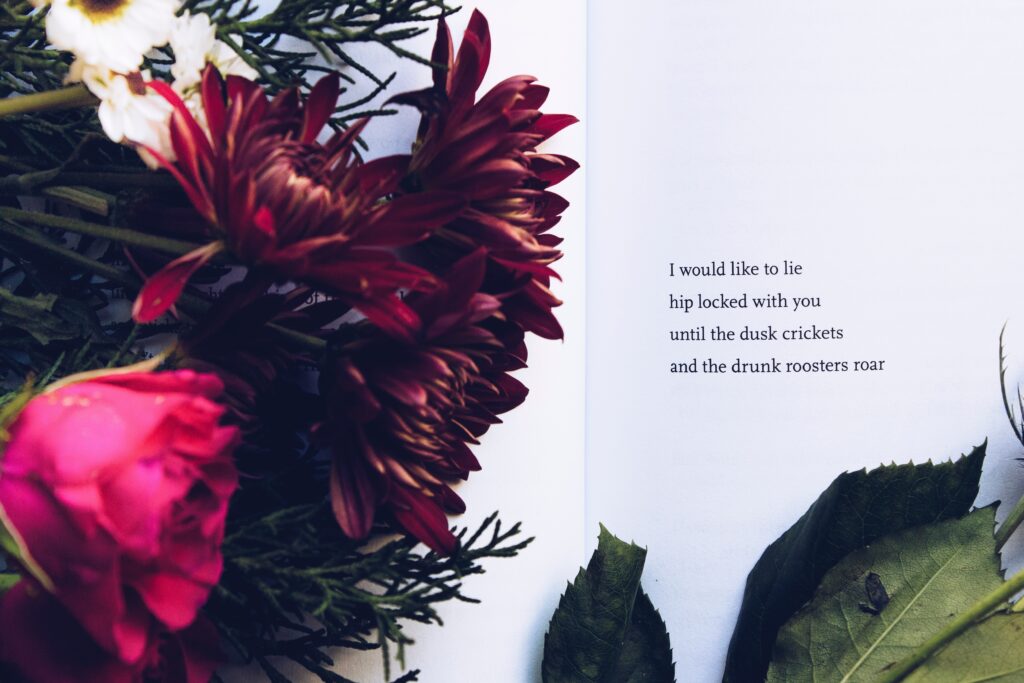Poetry can seem intimidating, but the world of poetry is vast and diverse! Today, poetry remains an essential part of art and culture. From Shakespearean sonnets to Aditi Rao’s poetic masterpieces, poems are long-lived, read, and recited for generations.
It’s easy to feel that it’s very difficult to read. One can also feel they are incapable of writing poetry. You might have heard that you misunderstood the poems you studied as a student or the poem you wrote, pouring your heart out, was full of clichés. But trust us, there are poems out there you will love and types of poetry you will enjoy writing. Whether you publish your poems on Instagram or write them for magazines and other platforms, it is essential to know what all forms exist. And no work of art produced from the heart is bad, even if it might look like a cliche to someone. Also, what’s wrong with cliches?

Here are some forms you can attempt to read or write:
Blank verse
Blank verse is poetry written with a precise meter—almost always iambic pentameter—that does not rhyme. It was developed in Italy and became widely used during the Renaissance because it resembled classical, unrhymed poetry.
Rhymed poetry
In contrast to blank verse, there is a rhythmic synergy in this poetic form.
Free verse

It lacks a consistent rhyme scheme, metrical pattern, or musical form. It is a popular style of modern poetry, and as its name suggests, there is a fair amount of freedom when writing a poem like this. It can rhyme or not, have as many lines or stanzas as the poet wants, and be about anything you like! So, while free verse may sound simple enough, the lack of rules makes this form of poetry tricky to master!
Epics
It is a long narrative written as poetry. These long poems typically detail extraordinary feats and adventures of characters from a distant past.
Haiku
A haiku is a three-line poetic form originating in Japan. The first line has five syllables, the second line has seven syllables, and the third line again has five syllables. They are known to paint a vivid picture in just a few words.
Pastoral poetry
A pastoral poem concerns the natural world, rural life, and landscapes. Common topics of pastoral poetry include love and seduction; the value of poetry; death and mourning; the corruption of the city or court vs. the “purity” of idealized country life; politics (generally treated satirically: the “shepherds” critique society or easily identifiable political figures).
Sonnet

A sonnet is a 14-line poem, typically (but not exclusively) concerning the topic of love. Sonnets contain internal rhymes within their 14 lines; the same rhyme scheme depends on the style of a sonnet. This ancient form of poetry was made famous by William Shakespeare, but the sonnet originated in 13th century Italy, perfected by the poet Petrarch. The word ‘sonnet’ comes from the Italian word ‘sonnetto,’ which means ‘little song.’ Traditionally, sonnets are made up of 14 lines and usually deal with love. As a rule, Petrarchan (Italian) sonnets follow an ABBA ABBA CDE CDE rhyme scheme, whereas Shakespearean (English) sonnets are typically ABAB CDCD EFEF GG.
Elegies
It reflects upon death or loss. Traditionally, it contains themes of mourning, loss, and reflection. However, it can also explore themes of redemption and consolation.
Limerick
A limerick is a five-line poem that consists of a single stanza, an AABBA rhyme scheme, and whose subject is a short, concise tale or description.
Pro tip: Always recite poetry out loud. It is not meant to be read from a page of paper or a website. It can generate emotions, convey messages, start conversations, and become a vehicle for your platonic or romantic relationships.
As Charles Baudelaire says, “Always be a poet, even in prose.”
Android: https://play.google.com/store/apps/details?id=com.empowrclub.app


This Post Has One Comment
Pingback: Books everyone should read at least once (Part 1) - Empowrclub